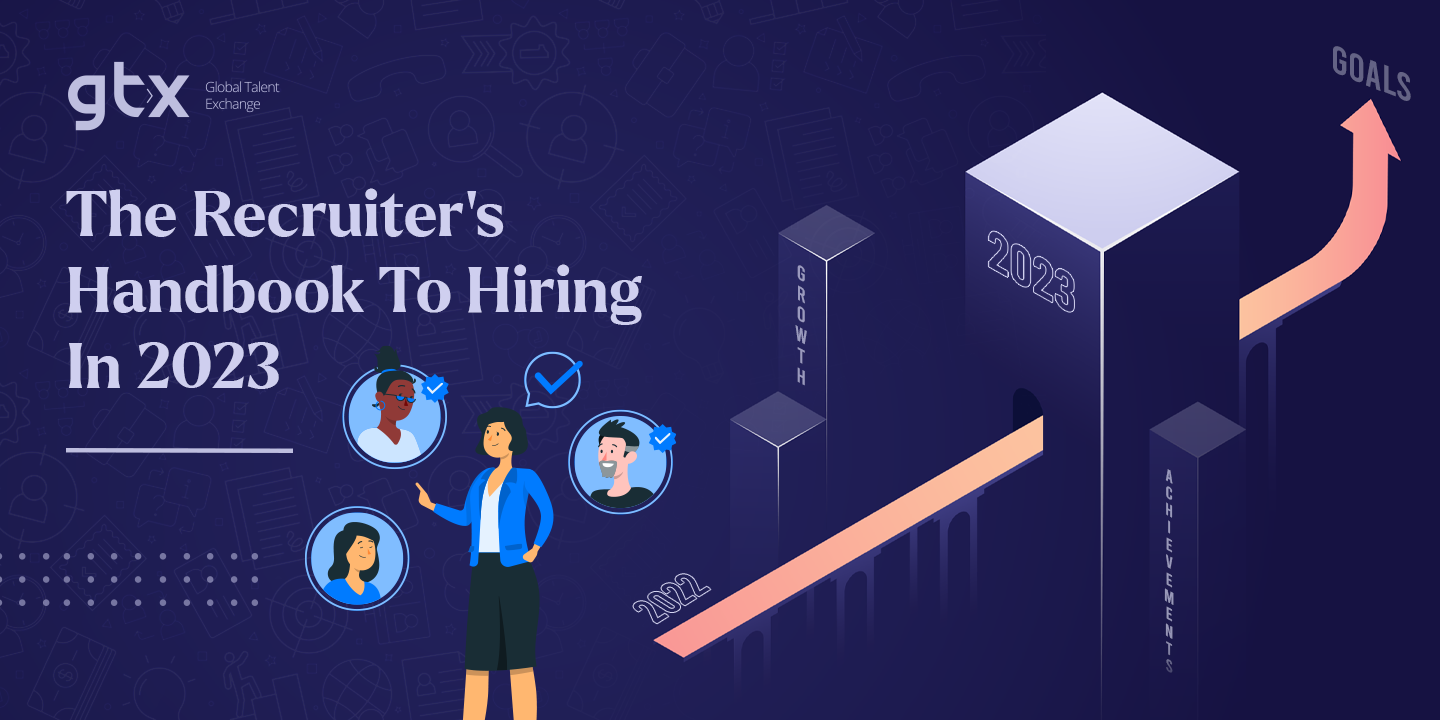As we’re all ready to turn the page to the new year, it’s difficult to oversee just how much the hiring landscape has evolved within just a few years. Be it because of the COVID-19 pandemic causing a shift in the way companies approach recruiting or a general change in the market sentiments calling for an employee-focused approach, there’s a lot to take in.
This shift has presented HR managers with new challenges, who must now navigate an ever-evolving job market and adapt their strategies to suit the climate.
Despite these hurdles, recruitment remains a vital function for any organization looking to grow and succeed- and heck, even remain afloat. Not having the correct talent is often identified as the primary weakness of any business and strips them of any competitive advantage they were seeking.
In this guide, we shall explore how these past twelve months have been, what to expect from 2023, and most importantly, what changes you can make to your approach to be more effective.
So, whether you’re a seasoned recruiter or just getting started, this guide is for you!
Challenges & Opportunities In 2022: What We’ve Learned
Here’s a quick recap of some of the major challenges that recruiters faced.
How many of these do you relate to?
Remote teams
The pandemic made one thing clear- remote work is here to stay. Professionals around the world opt for working remotely due to the flexibility the model has to offer. They often find themselves being increasingly more productive without having any overhead expenditures.
However, it wasn’t easy to manage for the organizations. Communication and collaboration often took a hit and new strategies had to be devised to ensure continuous engagement. Many businesses were coerced into adopting a remote or hybrid model due to the lack of skilled talent wanting to come on board otherwise.
Talent Retention
The “Great Resignation” has been highly discussed this past year as the employee turnover rate exceeded pre-pandemic levels by nearly 20%. This has proved costly for companies in terms of the resources that go into training and nurturing a new hire and has undoubtedly weakened morale and team productivity severely in businesses around the world.
Broadening Skill Gap
The market stops for no one. Despite disruption being rampant in the industry, innovation and progress continued and organizations found themselves scrambling to meet the new demands- often arriving at the shocking revelation that they didn’t have the necessary talent and expertise on board to achieve what they want to. The major missing link- you guessed it- were the tech and digital skills within the team, especially for niche areas like AI, ML, VR, etc.
Attracting the correct talent
The war for talent was relentless this year. The priorities of the job seeker changed drastically- an opportunity was no longer only about the paycheck. Several professionals carefully considered what the company they were interviewing for had to offer. ‘Is the work-life balance good? Do they take well-being initiatives? What does the diversity policy look like? What are my chances of growth?’
While it’s great that the situation has evolved this way, hiring managers faced a major challenge in hiking the packages and adding on lucrative benefits to ensure they get the “cream of the crop”.
Cost cutting
Those massive pay hikes and panic-recruiting drives were bound to catch up with the organizations eventually.
Toward the end of 2022, we witnessed a drastic increase in mass layoffs with huge corporations like Twitter, Meta, and Google letting their talent go due to the immense financial strain. Recruiters’ hands are tied- they’re unable to bring on the expertise required due to these cost-cutting initiatives and tightened operational budgets. The question arose: Can we do more with less?
Despite the challenges faced, HR teams have made significant progress in adapting to the changing landscape. However, as we enter 2023, it's important to focus on what lies ahead and continue to be proactive in our approach to recruiting. By staying up-to-date on industry trends, leveraging technology, and prioritizing diversity and inclusion, it’ll be easier to effectively navigate the challenges and find top talent for their organizations.
Recruiting Outlook: What To Expect In 2023
Workplace flexibility
What was a major challenge in 2022 is likely to become a strength for both employees and employers. With advances in tech, companies appear well-equipped to effectively balance and manage their remote teams.
These months helped people explore the benefits of offering flexible work arrangements- not only does it enable organizations to cut costs on office space and utilities but also they are no longer restricted to hunting for talent within a limited geographical area.
With the increase in the prevalence of remote work, it’s crucial for hiring managers to proactively devise strategies to manage it and overcome the hurdles faced previously. This includes clearly communicating expectations and guidelines to employees for remote work, ensuring the necessary technology and infrastructure to support it, and providing ongoing support whenever needed. Also, it’s certainly not a one-size-fits-all situation- every organization will have its own approach, and trial and error is highly encouraged till you find what works best.
Prioritizing employee wellness
The workplace disruption has taken a toll on everyone and led to an increase in burnout among professionals, causing many to quit their jobs because of it. It’s 2023- people should no longer have to choose between remaining healthy and having a stable job.
The next year will see organizations recognize the importance of supporting the physical and mental well-being of their employees. This can be done through effective strategies like employee assistance programs, training for all on how to support their co-workers, and promoting a culture of openness, communication, and inclusivity.
Focusing on fostering healthy work-life balance within the team enables them to be drastically more productive in the workplace and has proven to be effective at reducing attrition rates.
Even a gentle redesign of the employee experience can have far-reaching benefits. Businesses that prioritize enhancing engagement and good health are likely to outperform their competition and increase revenue growth by 2.5 times.
Automation
A survey done on 2848 recruiting professionals displayed that the majority believed that investing in recruiting tools and tech leads to a drastic improvement in the process. 2023 will inevitably see a rise in automation for simplifying repetitive tasks and reducing cumbersome admin work, freeing up time for more complex and strategic initiatives and actually engaging with candidates to get to know them before onboarding them.
A closer look would reveal an increase in the demand for applicant tracking systems (ATS) which allow organizations to efficiently manage and track job applications, resumes, and candidate information. It also makes it easier to send out emails and schedule interviews.
Technology can take some time to get used to, but once some of these practices are incorporated into the recruiting process and utilized regularly, hiring managers often feel they help them proactively take charge of the several tasks on their plate and significantly streamline the workflow.
Diversity, Equality & Inclusion (DEI)
The importance of a diverse and inclusive workplace becomes glaringly obvious as time goes by. 2023 will witness a range of initiatives, including increasing the representation of underrepresented groups in teams, promoting equal opportunities and benefits, and creating a culture that celebrates differences and diverse perspectives.
Gen-Z, especially, has made it a point to highlight systematic discrimination in the workplace, forcing businesses to do better and think about this factor in greater depth.
Employer branding
Employer branding has always been extremely important, especially if organizations are seeking to attract top-notch talent in 2023. The competition is only going to get more fierce, and there should be a reason for skilled talent to choose to work with your business rather than a competitor. Employer branding is essential to establish yourself in the market as an attractive workplace; one in which people can see themselves building a career and being in it for the long run.
A strong employer brand can help a company attract talent by demonstrating its values, culture, and unique offering. A good way to go about this would be to highlight the company’s mission statement, benefits and perks, flexible work arrangements, training and development opportunities, and a positive work culture.
Not only does it enable HR managers to attract new talent, but it also helps in retaining the current employees and keeping them happy- and that’s always a plus!
Recruiting managers will assume business leader positions
Up until now, the trend has been that recruiters have often operated as per what the business leaders say. This is likely to change significantly in 2023.
Recruiting managers and talent acquisition specialists are the people in the organization that best understand where the gaps lie and what would be required to fill them. They also have a unique understanding of what it takes to build a strong and successful team. They are thus, best equipped to call most of the shots when it comes to talent management in a way that will best lead the organization to meet its goals at the earliest.
A great supplement to this is the fact that recruiters have a good rapport and solid network with the professionals in the organization. This means that employees are more likely to be more open about the challenges they are facing at the workplace and they can be effectively dealt with in time, leading to a drop in attrition rates.
Of course, to assume leadership positions recruiters will need to build on their existing skills and knowledge and may need to pursue additional training or education. This includes developing their leadership skills, gaining a deeper understanding of business strategy and management, and building their knowledge of the industry in which they work.
Employee value propositions
An Employee Value Proposition is a statement that outlines the benefits and “value” that an organization provides to its employees- it’s often considered crucial, especially when businesses are looking to attract skilled and experienced professionals. This is because before taking an important career decision, employees of today need to know how their journey will map out; they seek personal and professional development and are not scared to demand it. This trend isn’t going anywhere in 2023.
It’s important for business leaders to plan the journey for their employees and display a proper path of growth and success if they want to retain the people that make their company what it is. The best way to do this is by seeking out the expertise of HR managers and talent acquisition specialists, who are regularly in touch with the employees and have a fair idea of what they desire in their jobs. Moreover, it’s always advisable to go one step further and take the input from the employees themselves- garner feedback and use it to form your EVP policies. For the people, by the people!
Evolving Skill Requirements
Emerging technologies such as artificial intelligence, machine learning, and the Internet of Things have gained a lot of attention in recent years, and for good reason. These technologies have the potential to revolutionize industries and transform the way we live and work. As a result, companies all over the world are eager to jump on the bandwagon and incorporate them into their processes and operations.
However, adopting these technologies often requires a digital skillset that may not be present within an organization. In order to fully leverage their potential and “future-proof”, companies need team members who are proficient in areas such as data analysis, programming, and project management; without which they might potentially be missing out on significant benefits and opportunities.
This is exactly why there are certain skill sets and areas of expertise that are going to be far more in demand in 2023.
- Tech skills
Data storytelling:
Data storytelling is the process of using data to create a narrative that communicates information and insights in a clear and compelling way. It is a valuable skill set that is expected to be in high demand in 2023 and beyond, as an increasing number of jobs will require teams to work with data.
In addition to data handling and interpretation, storytelling involves skills such as data collection, preparation, visualization, analysis, and presentation. It involves transforming data into digestible and useful insights that can be shared and understood by diverse audiences.
The importance of data storytelling lies in its ability to turn raw data into meaningful and actionable insights that can inform decision-making and drive business strategy. With the vast amounts of data being generated today, it is more important than ever for organizations to have team members who can effectively communicate and present data in a way that is accessible and understandable to all. As a result, data storytelling is expected to be a highly sought-after skill in the coming years.
Machine Learning and Artificial Intelligence:
AI and ML have become perhaps the most common buzzwords in the tech industry, and their importance is only expected to grow with time. According to the World Economic Forum's Future of Jobs report, 85 million jobs worldwide are expected to be replaced by AI by 2025. However, the report also suggests that 97 million jobs are likely to be created as well- there is always an expert behind the scenes!
IT professionals with knowledge of AI and ML will be in high demand in a variety of industries, including manufacturing, healthcare, financial services, and telecommunications. These technologies have the potential to revolutionize the way businesses operate and provide valuable insights that can inform decision-making and drive strategy.
Cybersecurity
Cybersecurity is becoming increasingly important as the number of cyber-attacks and data breaches continues to rise, causing financial and reputational damage to businesses. With many employees now working remotely and using their own devices, the threat to data has increased even further.
As a result, organizations worldwide are looking for skilled cybersecurity experts to join their teams and handle sensitive information, protect IT infrastructure, and manage cloud migrations. It is estimated that there will be a need for 10 million cybersecurity jobs in 2023 alone, making it a lucrative field.
Blockchain development and utilization
With its ability to improve security, transparency, and traceability, and reduce paperwork and the need for middlemen, blockchain is quickly becoming an integral part of many organizations. As a result, there is a high demand for professionals with expertise in blockchain development and proper utilization, particularly those with strong cryptography skills.
This technology has the potential to disrupt and transform a wide variety of industries. For example, banks and financial institutions can use blockchain to process and verify transactions more quickly and efficiently, reducing the need for intermediaries such as clearing houses.
In the supply chain management industry, blockchain can be used to track the movement of goods from the point of origin to the point of sale, ensuring the authenticity and provenance of products. This can help reduce fraud.
In the healthcare industry, blockchain can be used to securely store and share patient medical records, enabling faster and more accurate diagnoses and treatment. It can also be used to track the movement of pharmaceuticals through the supply chain, ensuring their authenticity and safety.
In the real estate industry, blockchain can be used to streamline the process of buying and selling property, by securely and transparently recording ownership and transfer of ownership.
Cloud computing
According to Gartner, global cloud spending is projected to reach $591.8 billion in 2023, an increase of over 20.7% compared to the previous year. This growth is driven by the increasing demand for digital transformation among businesses, with 82% of companies considering cloud migration as an essential step in this process.
The widespread adoption of cloud computing is expected to have a significant impact on the way businesses operate, as it offers many benefits, including reduced costs, increased agility and flexibility, and improved scalability and reliability. To take advantage of these benefits, it is crucial for companies to bring on talent that is skilled in cloud computing and related technologies, such as programming languages, database management, artificial intelligence, and machine learning. These professionals should also be familiar with popular cloud platforms, such as Amazon Web Services (AWS), Google Cloud, Oracle Cloud, and Microsoft Azure.
- Soft skills
In 2023, hiring managers are more likely to seek skills that go beyond tech expertise; skills that contribute valuably to the modern workplace. Tech knowledge is important, but at the end of the day, it isn’t sufficient on its own.
A few soft skills that are likely to be in high demand in the coming years include:
- Communication skills
- Problem-solving abilities
- Teamwork
- Adaptability
- Leadership
- Emotional Intelligence
- Creativity
Organizations will likely invest a large chunk of their resources to train their employees in these skills with additional development opportunities- which could then, pave the way for leadership roles within the company.
When we say hiring is about to get tougher- this is what we mean. Searching out the right person for the job has always proved challenging- but niche tech skills in addition to soft skills narrows down the talent pool drastically.
Quality Over Quantity
We’ve learned a few lessons from 2022- one of the major ones being that aggressive hiring without a plan is never a good idea.
After the pandemic’s impact faded, companies around the world took to recruiting and expanding their teams, in the hope that this would help them make up for lost time and they would be able to scale faster. However, soon, organizations felt their resources depleting faster than they had anticipated- leading to mass layoffs during the last few months of the year.
2023 is likely to see business leaders avoid such situations, and they shall now prioritize quality over quantity; the hiring process is likely to be much more selective, focusing on bringing on board only the most qualified and suitable candidates. Thus, recruiters might need to be a lot more strategic and rigorous in their approach now.
Global Hiring
Global hiring gain significance in 2023 for a variety of reasons. With the world becoming increasingly interconnected and dependent on global trade and economic activity, companies are looking to tap into new markets and talent pools in order to remain competitive. This requires them to look beyond their domestic borders and consider candidates from different countries and cultures.
Companies that are able to hire top talent from around the world will be better positioned to weather future crises and continue to thrive. It also helps organizations to gain new insights and ideas that can drive innovation and improve their products and services.
Global hiring unlocks the doors to a wider pool of talent, which enables firms to tap into a diverse range of skills, experiences, and perspectives than can help them remain a few steps ahead of the competition in the market- something that is highly desirable in the business environment of today.
This upcoming trend also poses a significant solution to the other challenges that have been discussed above- such as the lack of locally available skilled talent, lack of diversity, and a lack of strategy required to tap into markets around the globe.
Wrapping up
As we welcome the new year, one thing is clear as day- the recruiting landscape is likely to continue to be dynamic and unpredictable, and much as we try, we can never be ready for it all. The challenges of 2022 have taught us valuable lessons and have paved the way for the emergence of new and exciting hiring trends in 2023.
Despite the uncertainties of what lies ahead, there is a sense of optimism and excitement as we look ahead to the year to come- it promises to be an exciting and transformative year for recruiting.
To navigate this landscape and secure the best talent, companies will need a reliable and innovative recruitment partner- and that’s where we come in.
Global Talent Exchange’s platform effectively connects organizations like yours to top tech talent from skill-rich regions around the world, enabling them to stay ahead of the curve and remain competitive in the global job market.
Let’s go into 2023 by embracing with open arms the challenges and opportunities that lie ahead and make the most of them. We’re excited- are you?


















